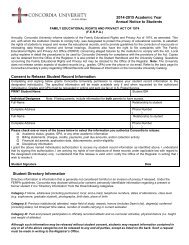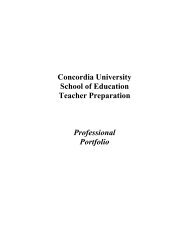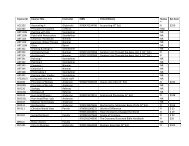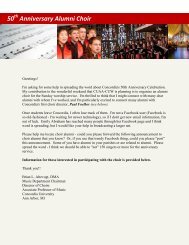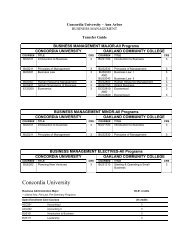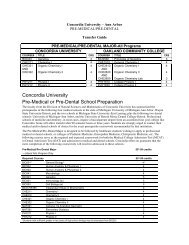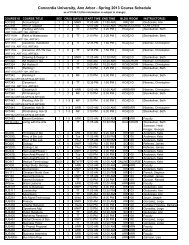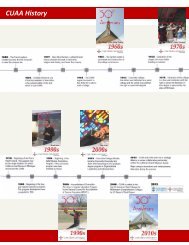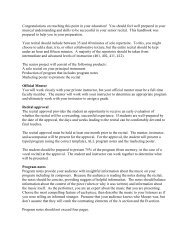2009â2010 Academic Catalog - Concordia University Ann Arbor
2009â2010 Academic Catalog - Concordia University Ann Arbor
2009â2010 Academic Catalog - Concordia University Ann Arbor
You also want an ePaper? Increase the reach of your titles
YUMPU automatically turns print PDFs into web optimized ePapers that Google loves.
<strong>Concordia</strong> <strong>University</strong> <strong>Ann</strong> <strong>Arbor</strong> 2009–2010 <strong>Academic</strong> <strong>Catalog</strong><br />
FAM390A Fieldwork IA credits: 3<br />
Students will spend 120 hours each semester in a supervised volunteer position at a local non-profit agency that provides support<br />
for families. Prerequisites: PSY211 & PSY212 & SOC345 & instructor's permission<br />
FAM390B Fieldwork IB credits: 3<br />
Students will spend 120 hours each semester in a supervised volunteer position at a local non-profit agency that provides support<br />
for families. Prerequisite: FAM390A & instructor's permission<br />
FAM411 Family Law & Public Policy credits: 3<br />
This course provides an understanding of the legal definition of the family and examines the laws which affect the status of the<br />
family. Historical development of laws relating to marriage, divorce, family support, child custody, child protection and rights,<br />
and family planning will be examined.<br />
FAM421 Family Life Education Methodology credits: 3<br />
This course enables students to develop knowledge of the scope, trends, and current issues in family life education methodology,<br />
as well as the opportunity to demonstrate the use of methods and materials. Prerequisites: PSY211 & PSY212<br />
FAM430 Foundations of Youth Ministry credits: 3<br />
Explores Biblical foundations for youth ministry. It will help students experience several youth ministry philosophies and<br />
challenge them to form their own definition and philosophy. The student will also define the role of the home and parents youth<br />
ministry programming and apply intergenerational programming design.<br />
FAM431 Youth Culture credits: 3<br />
Students explore the youth culture in America, ways to help teens in crisis, ways to stay current on youth culture issues, and<br />
learning the importance of building relationships with teens and parents. Students will also explore strategies to reach out and<br />
minister to youth in the community, apply theology to contemporary issues, and to set up policy to protect teens and adults from<br />
misconduct or false accusation.<br />
FAM432 Youth Ministry Administration credits: 3<br />
Students explore youth ministry administration as it applies to the local congregation. Students learn to develop short and long<br />
term planning skills, recruit and train volunteers, and manage youth budgets. The course will also explore change, leadership<br />
skills, and professional liability issues. Prerequisite: Sophomore standing.<br />
FAM433 Youth Ministry Seminar credits: 2<br />
Students explore personal issues in ministry, especially those that are specific to youth ministry. Students develop a personal<br />
devotional life, explore time management, and understand the importance of a congregation's unique history and culture. Students<br />
will also learn the dynamics of team ministry, navigating congregational conflict, and the importance of professional growth and<br />
support.<br />
FAM434 Practical Skills in Youth Ministry credits: 3<br />
Students explore basic skills in youth ministry. Students look at ways to identify, plan, implement, maintain, and lead a balanced<br />
youth ministry program to teens and their homes through fellowship, outreach, small groups, mission servant trips, fund raising,<br />
retreats, and more. Students learn how to speak effectively to youth, lead youth Bible studies, lead retreats evaluate youth<br />
resources, assess spiritual gifts of youth, and engage their gifts in Christian service.<br />
FAM483 Senior Project credits: 1<br />
Students combine research and practical implementation of theories and concepts to develop an individual project. Senior standing<br />
is required.<br />
FAM490A Fieldwork IIA credits: 3<br />
The capstone Family Life experience is in the fourth year and is called internship. Students use learned academic information and<br />
field experiences to serve in their area of interest under the mentorship of an experienced professional. Prerequisites: FAM390A &<br />
FAM390B & instructor's permission<br />
FAM490B Fieldwork IIB credits: 3<br />
The capstone Family Life experience is in the fourth year and is called internship. Students use learned academic information and<br />
field experiences to serve in their area of interest under the mentorship of an experienced professional. Prerequisites: FAM390A &<br />
FAM390B & instructor's permission<br />
FAM490C Fieldwork IIC credits: 6<br />
The capstone Family Life experience is in the fourth year and is called internship. Students use learned academic information and<br />
field experiences to serve in their area of interest under the mentorship of an experienced professional. Prerequisites: FAM390A &<br />
FAM390B & instructor's permission<br />
FRE101 Elementary French I credits: 3<br />
Introduction to French vocabulary, grammar, and culture, taught through listening, speaking, reading, and writing. Offered every<br />
fall semester.<br />
Pg. 105 of 118



